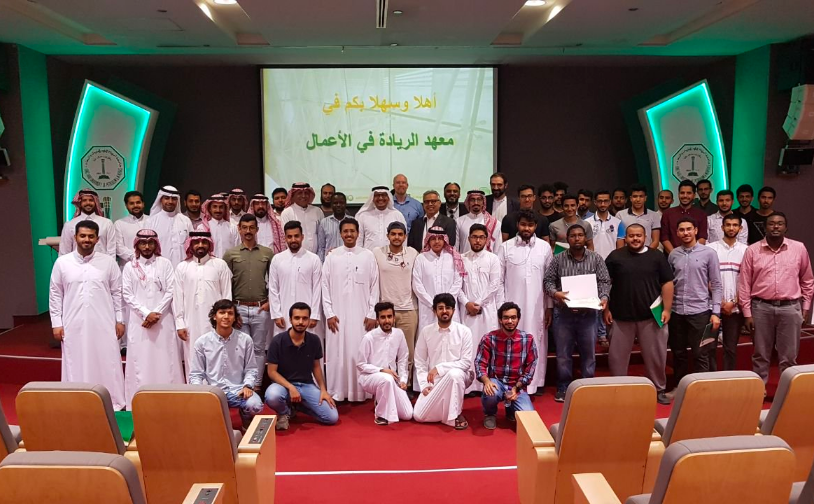
Introduction
It is well known that research plays an important role in advancing programs, organizations, systems and so on. The lack of research studies and reports on various important subjects related to Entrepreneurship/the creation of startups work as one main driver for us to conduct research in such subjects. The continuous efforts to improve on what we offer and do in the other two centers serves as another important factor of why we should be conducting research and studies on entrepreneurship. The lack of cases written about local successful entrepreneurs and/or startups that could be used in teaching is yet another important factor for us to have such a center. Hence, the center aims to conduct research studies to assist advancing and improving our institute’s programs and provide case studies for aspiring entrepreneurs to learn more about the challenges and opportunities of entrepreneurship.
Entrepreneurship Case Studies
Entrepreneurship is beginning to gain mileage in Saudi Arabia especially after the announcement of Saudi Vision 2030, wherein, entrepreneurship was mentioned as one of the key drivers the Saudi economy. This calls for a need to educate and motivate Saudi students to take up entrepreneurship. One simple yet powerful way to impart entrepreneurship education to our students is to write business case studies about local entrepreneurs in Saudi Arabia and use them in entrepreneurship classes to enhance student knowledge and learning about entrepreneurship and the various challenges it offers.
As things stand today, there are hardly any case studies about local entrepreneurs and their entrepreneurial journey. One of the biggest advantages of writing local business case studies is that it will enable students to learn about entrepreneurship and its challenges in a local setting rather than using a case from outside Saudi Arabia.
Technical Reports
There are several international reports analyzing the impact of innovation and entrepreneurship on the future of Saudi Arabia. The Global Entrepreneurship Index, the Global Innovation Index, World Economic Forum, and the Global Entrepreneurship Monitor provide insights into the country’s entrepreneurial standing in an international context. The Center for Entrepreneurship Studies draws on these insights and conducts different technical reports which are aimed at helping policy and decision-makers, both inside and outside the University.
Entrepreneurship Forum
The annual Entrepreneurship Forum is a flagship event that brings some of the world’s top experts in global higher entrepreneurship education together with major corporate players and entrepreneurs to discuss relevant topics and challenges in entrepreneurship over the course of multiple days event.
The Forum has been conducted six times and its aim is to promote and accelerate the development of the entrepreneurial ecosystem at KFUPM and in the regional community by:
- Introducing the KFUPM and regional communities to the current and future global academic entrepreneurship challenges and trends.
- Spreading awareness of international efforts in promoting entrepreneurship in academia.
- Bringing awareness of international efforts to build university entrepreneurial ecosystems.
- Exploring the issues characterizing academic entrepreneurship and understanding the contemporary relations between academia and business in engineering-based universities.
- Promoting the core mission of the university in building an entrepreneurial mindset.
The first six forums comprised of more than 48 talks and 16-panel sessions with the participation of more than 106 international and local speakers and panelists, and more than 950 delegates including faculty members, students, and guests. Forum sessions spanned a wide range of topics with a focus on entrepreneurial culture in academia, entrepreneurship in an engineering university, and entrepreneurial mindset.
Entrepreneurship Surveys
The Center conducts a number of surveys aimed at evaluating the level of entrepreneurial and business propensity among KFUPM faculty and student and exploring their perceptions towards entrepreneurship. These surveys are conducted online (launched during September and ongoing until October 26, just before the Entrepreneurship Forum). The surveys are repeated every year so more thorough analysis can be made to reflect the advancement of the evolving entrepreneurial ecosystem.
The surveys’ main objectives are:
- To assess how much KFUPM students know about Entrepreneurship and Technology Transfer.
- Determine the main characteristics of students who are interested in creating startups.
Chair Professor Initiative
As part of the Center’s initiatives to enhance and accelerate the growth of an entrepreneurial mindset, EI is hiring a chair professor, in collaboration with Saudi Aramco. The vision of the chair professor post is to position KFUPM Entrepreneurship Institute as a leading institution, known for its high impact entrepreneurial educational programs and studies on the regional entrepreneurial ecosystem. The chair professor position accelerates the advancement of KFUPM Entrepreneurship Institute educational programs and studies.
The position objectives are to develop:
- Research that explores the unique capabilities and circumstances of regional entrepreneurs.
- Oral and written history projects profiling significant living regional entrepreneurs including cases and stories.
- Entrepreneurship education and training programs that reflect regional values and perspectives.
- International conferences on scholarship that focuses on regional entrepreneurs.
The position key responsibilities are to:
- Help in building the institute and recruit other qualified scholars/professionals.
- Teach entrepreneurship courses, minor degree courses, short courses and business incubation programs.
- Conduct studies on KSA and regional ecosystems, entrepreneurial mindset development, entrepreneurial leadership, local entrepreneurs’ behaviors, etc.
- Write and teach case studies about local entrepreneurs.
- Write books and text-books on entrepreneurship, reflecting the regional values and perspectives.
- Plan and prepare for future international KFUPM entrepreneurship conferences.
- Develop, organize and deliver workshops, seminars, webinars, etc.